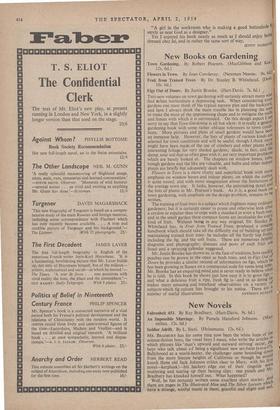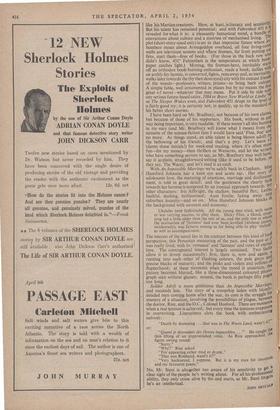New Novels
Fahrenheit 451. By Ray Bradbury. (Hart-Davis. 9s. 6d.)
An Impossible Marriage. By Pamela Hansford Johnson. (Mac- millan. 12s. 6d.)
Soldier Adrift. By L. Steni. (Heinemann. 12s. 6d.) MR. BRADBURY has for some time now been the white hope of the science-fiction boys, the vocal boys I mean, who write the articles in which phrases like `man's upward and outward striving' occur,tr boys who talk about s-f being a significant new art-form (s-n-a-I •)• Ballyhooed as a world-beater, the challenger came bounding doW11, from the more literate heights of California as though he would knock those old Jack Johnson critics clear to Mars; with his first novel—kerplunk!—his backers edge out of their ringside seas muttering and tearing up their betting slips: one punch and lwr. like his Martian creatures. Here, at least, is literacy and sensitivity But his talent has remained potential; and with Fahrenheit 451 it is, revealed for what it is: a pleasantly fantastical mind, a bundle 0' convictions about culture and a mistrust of mechanised living. The plot (short-story-sized only) is set in that imprecise future where Jet' bombers moan about Armageddon overhead, all four living-roell; walls are television screens and Where firemen, far froth putting 0,13:
didn't start them—fires of books. (For those in the back row '
didn't know, 451° Fahrenheit is the temperature at which boa' paper catches light.) Montag, the fireman-hero, inevitably starts off an orthodox book-burning enthusiast, reads a book, dallies With ) an archly fey heretic, is converted, fights, runs away and, as inevitably' walks later towards the (by then destroyed) city with his outcast friends of the woods—professors, writers, priests—to bring back culture: A simple fable, well ornamented in places but by no means the hestt great s-f novel—whatever that may mean. Put it side by side any serious future-based satire, 1984 or Brave New World or Limbo or The Sleeper Wakes even, and Fahrenheit 451 drops to the level of a fairly good try; it is certainly not, in quality, up to the standard 01 his better short stories.
I have been hard on Mr. Bradbury, not because of his own claims, but because of those of his supporters. His book, without in any way being important, is very readable. If there weren't all this buzzing in my ears (and Mr. Bradbury will know what I mean) from the screams of the science-fiction fans I would have said 'Fine, fine' and no more. As things stand,• an able talent is being blown adrift 9. the bellowing of his friends; and that's a pity. Let's leave s' (damn those initials!) for week-end reading, where it's often more fun—for my money—than thrillers or Westerns, and let the writers who have something serious to say, as Mr. Bradbury may well have, say it as plain, straightforward writing (like it used to be before, 39 they say, The Wars); and let's read it as such. With An Impossible Marriage we're safely back in Clapham. Miss Hansford Johnson has a keen eye and acute ear. Her story of adolescent love, the maturing of emotions, marriage and disillusion- ment, is told in great detail; and the gentleness she clearly feels towards her heroine is tempered by an ironical approach towards her other characters: Iris Allbright, the shallow, beautiful flirt; Leslie' bashful, dashing, brilliantined; Aunt Emilie, fading away into suburban insanity—and so on. Miss Hansford Johnson blocks In the background with sureness and economy: Ukeleles were fashionable. All the young men tried, with more or less varying success, to play them. Dicky Flint, a blond, strap' ping lad a little older than the rest of us, and the only one at whose the accusation of 'fastness' had ever been levelled (without Justice) incidentally), was famous among us for being able to play 'tnelodY as well as accompaniment. The interest of the novel lies in the contrast between this kind of long perspective, this Proustian measuring of the past, and the past as I was really lived, with its 'romance' and 'fastness' and vows of etern,a, love. The contrapuntal interest is largely sustained. Two fan° allow it to droop occasionally: first,. there is, now and again, running into each other of *clashing colours, the pale greys an 4. precise blacks of maturity, and the pinks and violets and yellows 'a' fiapperhood; at these moments when the mood is uncertain, the picture becomei blurred, like a three-dimensional coloured photo- graph seen without glasses; second, the book is perhaps fifty pages too long. Soldier Adrift is more ambitious than An Impossible Marriage' and succeeds less. The story of a troopship laden with bloodY' • minded men coming home after the war, its core is the struggle for mastery of a situation, involving the possibilities of plague, betweels the doctor, Rice, and the 0.C., Colonel Hosford. There are moments when a real tension is achieved; but every time the tensions evaporate in overwriting. Literariness clots the book with embarrassing
natvetes:
"Death by drowning ... that was in The Waste Land, wasn't it'
or:
"Quand je descendais des fleuves impassibks... ." He caught the thin lilting of an impoverished voice. As Rice approached, in° figure swung round.
"Sorry."
"Why?" Rice asked.
• "For appearing either mad or drunk." "That was Rimband, waset it?"
"Very hackneyed, I suppose. But it is my cure for insomnia and my favourite poem." No, Mr. Steni is altogether too aware of his sensitivity to get al clear sight of the people he's writing about. For all his profession_ ability, they only come alive by fits and starts, as Mr. Steni forgets he's an intellectual.



















































 Previous page
Previous page